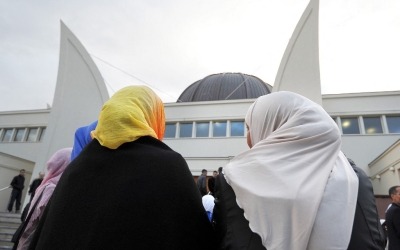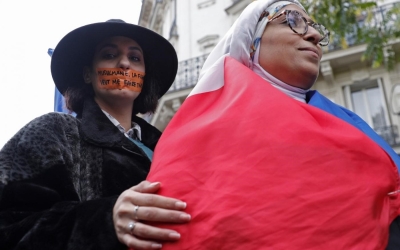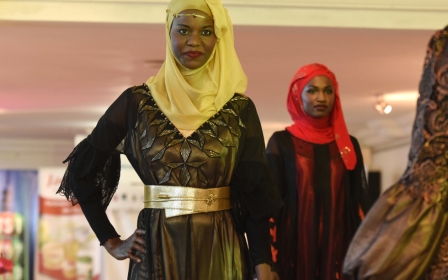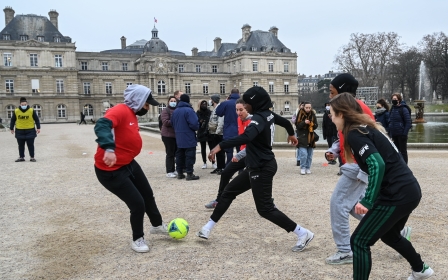France: Veiled Muslim women and the politics of the new secularism
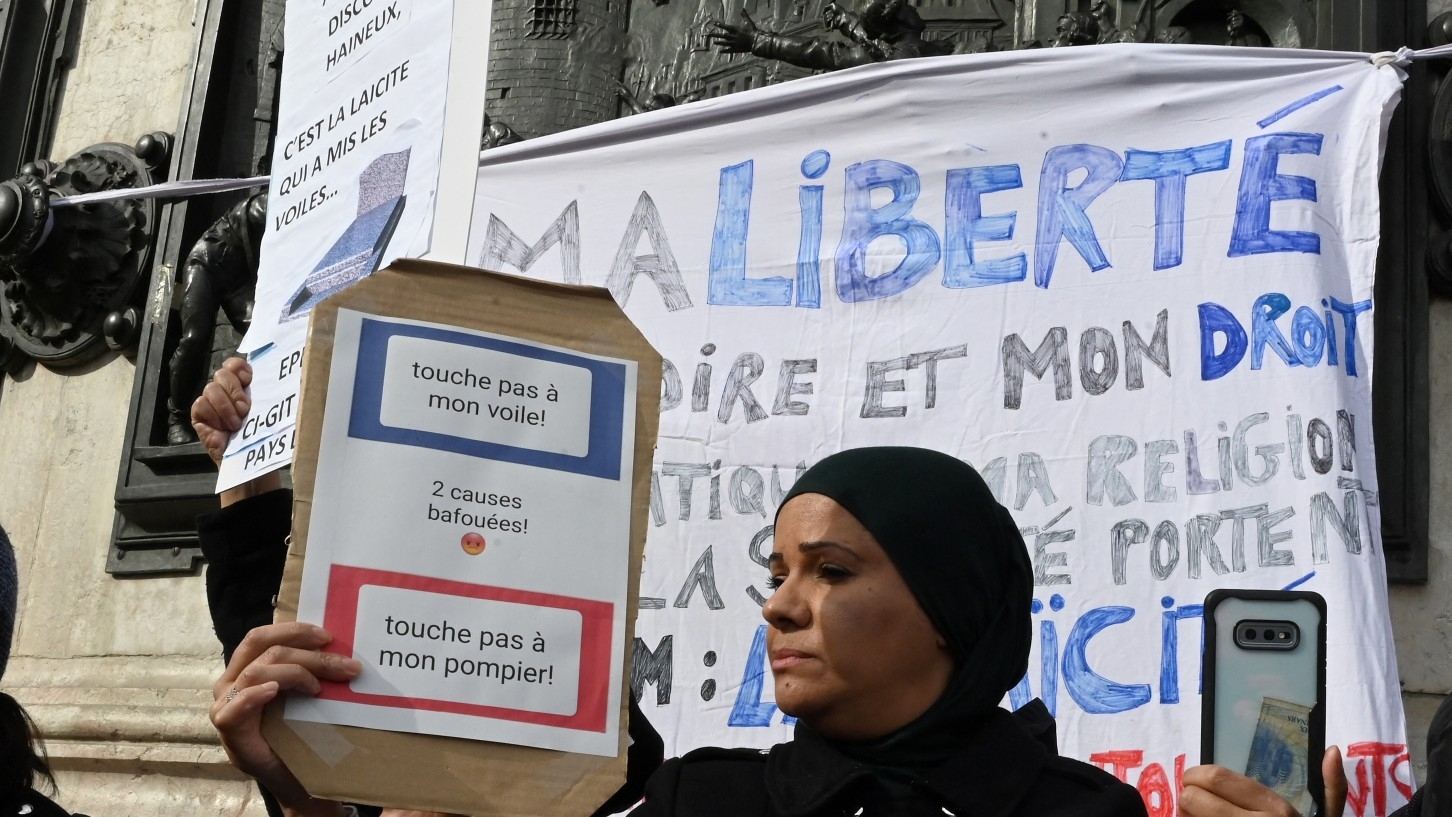
The exclusion of Muslim women who wear the headscarf in France reveals the hegemonic order enforced in the country, as well as the sexism and racism that characterise it.
In my book, Are Muslim Women Not Women?, I borrow from bell hooks, an African-American intellectual, and apply to Muslim women who wear the Islamic headscarf in France the question she asked about the exclusion of Black women from the feminist struggle.
In the end, they, too, are excluded from the cause of women. This is what struck me in 2017 during a public debate on the question "Does secularism guarantee equality between men and women?", an event organised by the Senate delegation for women's rights.
In the heart of the Luxembourg Palace, I was publicly booed because I had dared to respond to feminists who were advocating for an even wider ban on the veil. "If I understand correctly, you want to exclude women under the guise of gender equality," I said. "Isn't that paradoxical? Need I remind you that under the veil, there are women."
These women oppose women who choose to wear the headscarf in France, comparing them to those who suffer in Iran, Saudi Arabia and Afghanistan, where they are forced to wear it.
New MEE newsletter: Jerusalem Dispatch
Sign up to get the latest insights and analysis on Israel-Palestine, alongside Turkey Unpacked and other MEE newsletters
These very women are fighting in these countries to be able to survive as women, to go about their lives freely, to study or work or to become top athletes. And yet, there we were in the process of deciding on the merits - about "equality between men and women" - of excluding them from participation in the Olympic Games because they wore what is imposed on them in their countries.
Radical otherness
This dilemma guided the writing of this book, the chapters of which come from sections of my doctoral thesis, Assignment to Radical Alterity and Paths to Emancipation: A Study of the Agency of French Muslim Women. I wanted to focus my remarks on the origin of the discrimination and exclusion that target Muslim women who wear the headscarf.
To do so, I traced the fabrication of "the radical otherness" of French people of African and North African descent, which finds its origins in the exclusion and stigmatisation of post-colonial immigrants in the 19th century and, before that, in the way French imperialism viewed Islam as "the imperial enemy", as the French philosopher Mohamed Amer Meziane has explored.
I relied on many authors to retrace this socio-history, in particular the Algerian sociologist of "emigration-immigration", Abdelmalek Sayad, who was a true precursor of a new sociology of Islam.
In this work, I paid particular attention to questioning the framework from which we think about social phenomena, without which biases and unexamined assumptions, especially regarding North/South relations, prevent objective reflection.
Islam is a "dominated" religion because it is a "religion of the dominated" but also, previously, of the colonised under "protection" or French domination. France has thus built a relationship of domination with Islam and Muslims, and sometimes even an enterprise - at times concealed, at times assumed - to domesticate Islam and Muslims.
Tracing the political socio-history of the marginalisation of immigrant and Muslim populations of African and North African origin has allowed me to study the filiation between the hated figure - the incarnation of "heretical femininity" - of "veiled women" and her ascendants.
Undesirable and illegitimate
This is what I propose in my work, where I focus on this "figure", on the political discursive construction of which it is the object, and on the alleged or perceived dangerousness associated with that figure.
Women who wear a headscarf are not only undesirable and illegitimate in the eyes of the nation - they are undisciplined creatures who must be educated and converted. If they resist, they become dangerous and are then stigmatised as such: now they are the Muslim enemies.
Laws and regulations, speeches and attacks, make them, in the eyes of their detractors, women stripped of their humanity and their femininity
The goal is to prevent them, in a "civilised" way, from evolving in their society by restricting their access to certain spaces and certain functions through the creation and expansion of rules of religious neutrality that are incompatible with the wearing of the headscarf.
Laws and regulations, speeches and attacks, make them, in the eyes of their detractors, women stripped of their humanity and their femininity.
I then describe the discriminations, the exclusions; their mechanisms but also the forms of domination and their alienating effects. I also identify the alliances that are created to protect the French hegemonic order, in particular between feminist groups and political groups that come together to reorient and redefine secularism - what I call the policies of the new secularism.
Ultimately, what is at stake is the preservation and centrality of a hegemonic and, it must be remembered, normative order. Its centrality allows me to conceptualise the notion of paradoxical femininity.
A paradoxical femininity
In the game of domination, women are positioned on a scale designed to evaluate their conformity to "good" femininity. "Bad" femininity, meaning bad or dangerous women, are disqualified, caricatured, despised and stigmatised - they are targeted as heretics to the hegemonic order.
And the women who personify this bad femininity endorse a paradoxical femininity: they embody both a heretical femininity vis-a-vis the partisans of the new secularism and a hegemonic femininity vis-a-vis the supporters of an orthodox reading of Islam.
My book also aims at a disalienation vis-a-vis the hegemonic order and more specifically one of its mainsprings: hegemonic femininity. This is why I have also chosen to name the alienation of the dominant group a racial hegemony, which is never recognised as such but which is nonetheless real, as is the case with universalist feminists.
I also name the alienation of the dominated, who find themselves locked up despite themselves in a reactionary posture towards the power that the dominants exercise over them.
Relations of domination imply effects: alienation is unknown, implicit and mechanical. It affects perceptions and perspectives, worldviews and bodies.
This aspect seems central to me. Excerpts from interviews provide a striking account of how Islamophobic domination distorts the bodies of the women concerned, altering their self-esteem, which sometimes leads to the desire to distinguish themselves from the group of stigmatised peers.
This distinction is also a source of alienation and illustrates the incorporation of social contempt, racism and Islamophobia.
The views expressed in this article belong to the author and do not necessarily reflect the editorial policy of Middle East Eye.
Middle East Eye delivers independent and unrivalled coverage and analysis of the Middle East, North Africa and beyond. To learn more about republishing this content and the associated fees, please fill out this form. More about MEE can be found here.



